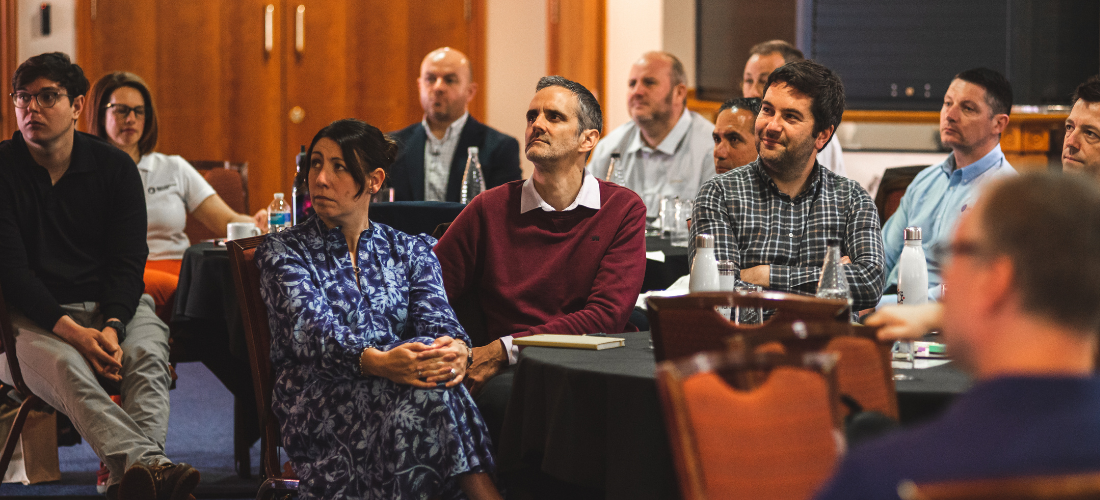We are moving further into a technological age, where AI, robots, and automation are taking on more tasks. AI is moving at such a pace, that for most modern platforms now, having an AI button is a necessity just to keep up. OpenAI has ChatGPT, Microsoft has Copilot, and a lot of websites now have live AI Chatbots as standard.

So, what does AI and technology have to do with leadership and self-awareness?
One dimensional, highly logical leaders will be mostly replaced by AI. It will be emotionally intelligent and self-aware leaders that will lead the businesses of the future. AI and technology will continue to advance and will take over more and more logically driven tasks, leaving more space for emotionally mature leaders to support the workforces of the future.
That’s not to say emotionally intelligent leaders should ignore technology. Quite the opposite. Technology will play a big part of the future of industry, and leaders of the future will need to understand how to lead people in a very different and technologically advanced world.
The World Economic Forum’s Future of Jobs Report 2023 states that the top 10 skills required across industry today are:
- Analytical Thinking
- Creative Thinking
- Resilience, Flexibility, and Agility
- Motivation and Self-Awareness
- Curiosity and Lifelong Learning
- Technological Literacy
- Dependability and Attention to Detail
- Empathy and Active Listening
- Leadership and Social Influence
- Quality Control
WEF also state that due to technology advancements, climate change and economic trends 44% of core skills will change over the next 5 years.
For leaders to thrive they will need to take advantage of what differentiates us from technology – being human and having the capacity to be self-aware.
What is self-awareness?
Self-awareness is much easier to understand as a concept than it is in practice. Conceptually, being self-aware means that you have a deep level of understanding of who the authentic version of yourself is, and how you are perceived by others.
In practice, here are nine self-awareness examples for leadership:
- Knowing how you are feeling
- Managing your thoughts
- Understanding your own values
- Having a clear purpose
- Asking for feedback
- Putting time aside to reflect
- Listening
- Understanding how you are perceived by others
- Making the right decisions
And many more things than the few listed above, so a complex discipline to master and stay tuned in with. And for a lot of people looking down the list makes you feel like… I don’t have time for all of this… I’m too busy. But are you self-aware enough to know that you are ‘busy’ doing the right things? And are you ‘busy’ leading your team, or stuck in the weeds busy doing tasks you shouldn’t be doing?
What are the best strategies to help you become more self-aware as a leader?
There are a few strategies that can make becoming more self-aware easier and accessible for all leaders. Having exposed myself to a lot of these tools and techniques myself, and having worked with hundreds of leaders with varying levels of self-awareness, these are the 4 that I feel work the best.
- Journalling. Taking time out of your day (I believe this should be every day) to reflect and journal is a powerful way leaders can learn who they really are. Committing to paper what you are thinking and feeling, helps you to understand yourself better, and stops you from over cluttering your own brain. Some of the key questions I reflect on, and make notes on every day are:
First thing in the morning
- What are you grateful for?
- How will you experience joy and fulfilment today?
- How will I be a loving person today?
- What do you need to let go of?
Last thing at night
- What went well today?
- What feelings have I experienced and why?
- What has today’s lesson been?
- What will I do differently tomorrow?
You could create your own questions for yourself that are pertinent to you. These questions have been working well for me, for around 6 months now. I feel lighter, not carrying everything around in my head. I feel more fulfilled, due to being more grateful. I am taking control of my day when I wake up. I feel more confident knowing that I am doing things well each day, learning, and making progress.
- Feedback. Receiving feedback from your team helps leaders (the ones that are open to learning) to understand their strengths, areas for development and any blind spots that may be present. Asking for feedback can be challenging, particularly if you level of self-awareness is low, as nobody wants to tell their boss that they have a weak area.
Anonymised 360 feedback can be a useful approach to get straight to the nub of your strengths and weaknesses. You don’t know what you don’t know, so if you’ve never had a 360 done before, it is highly likely that you will have blind spots and development areas, that you are not aware of. Hence, your self-awareness will naturally be lower.
People and cultures also change over time. Like tectonic plates, cultures are always slowly shifting. Similar to comedy, jokes told by comedians 30-40 years ago are just not funny anymore, often offensive in today’s environment. Leadership is the same. Telling the same jokes, leading in the same way as we did 30 years probably isn’t working.
- Coaching. Getting out of your own head and having someone who acts as a healthy sounding board, is critical to growing a as leader. Having regular coaching sessions where your thinking is challenged through great quality questioning, reduces the risk of you getting stuck, and keeps you moving forwards.
We all need someone to hold the mirror up to help us develop our levels of self-awareness as a leader, and a great coach will provide a safe space where you feel you can be vulnerable and open, without the fear of judgement or criticism. A great coach will provide direct feedback on how you are perceived by others, and help you to become more self-aware in a respectful and gentle way.
The best coaches are fantastic listeners with very little ego and ensure that your needs and journey are the priority. It’s a great feeling knowing that someone has your back, and you can share anything and everything with them when you need to.
Improving your self-awareness as a leader is a process that will require you putting into action new learnings and behaviours, and quite possibly removing habits that are not serving your well. Why do all this work on improving your levels of self-awareness and then do nothing with it?
A big part of a coach’s roles in your development is to help you make better decisions and act. Helping you to explore how new ways of leading will affect you and your team. You need someone with no agenda to hold you accountable.
- Diversity. Modern leaders need to be able to adapt to different people and situations in an instant to make the best decisions, so being used to having conversations with diverse groups of people is invaluable.
Adaptability and agility are key traits for modern leaders who are working in a changing environment, so having access to a wider bandwidth of people, cultures, and thinking is a huge advantage to have in your toolbox. It stops you from having too many biases and doing what you’ve always done. You see difference as healthy, and ways of learning new things. As opposed to seeing difference as a threat and something to avoid.
We often mix with our own people, our tribe, people like us, which is understandable, because it feels good to be around people like you. But the real learning and opportunity to develop your own self-awareness is to spend time with people who are not like you. People who will stretch your thinking. People who do things differently.
Spending time with more diverse groups of people will not only improve your leadership style and self-awareness levels, but it will also help to improve society as a whole. Leaders who embrace this will bring mixed groups together as a team and help them to understand each other. Help them to see that diversity is a strength that drives innovation and more wholesome cultures.
How can the Manufacturers’ Alliance help you with your self-awareness and leadership development?
At the Manufacturers’ Alliance we have been helping leaders in the manufacturing industry to grow and develop for over a decade and have seen first-hand what works well in the industry:
Self awareness training for leaders:
- 360 Leadership Profiling – We have developed a range of 360 profiling tools for leaders with responsibilities at different levels of a manufacturing organisation, from CEO through to team leaders. It provides you with the opportunity to benchmark yourself against leadership best practice and receive anonymised feedback from your team. Explore 360 Profiling for Manufacturing Business Leaders.
- 1-2-1 Coaching – We have a team of excellent coaches who have different areas of expertise and support leaders with very different coaching needs. We support leaders who are new to leading with developing a great team around them, to leaders at the latter end of their career preparing for exit. We support ambitious leaders in mastering the art of planning for growth, to experienced leaders who are looking for a sounding board to explore new ideas. Whatever the leadership development challenge, we have coaches who specialise in moving you forwards. Explore 1-2-1 Coaching for Manufacturing Business Leaders.
- Peer Groups – We have a diverse group of business leaders that are part of our amazing community of peer groups across the North of England & Wales. You get the opportunity to expand your thinking by mixing and sharing ideas with leaders from different sectors in manufacturing. You see how others lead their teams and many forms of modern best practice that is having a big impact in today’s environment. Try a Peer Group for Manufacturing Business Leaders.
Conclusion
We are experiencing times of rapid change across many dimensions. Technology, sustainability, economic, and cultural changes are already affecting the future of UK manufacturing. As leaders we have a choice. We can allow the tides of change to push and pull us around, or we can take responsibility and act. Work hard on building our capacity to lead and do the right thing. It’s time for the leaders of industry to master the art of self-awareness, and learn to lead the UK through positive change.
This article was written by Gary Sheader, the Founder & Managing Director of the Manufacturers’ Alliance. Gary is passionate about UK manufacturing and developing the leadership capabilities the sector needs to secure the future for the whole sector. He sees modern leadership as something that can be a force for good in the world, and can transform our societies and communities, as well as the manufacturing industry as a whole.


